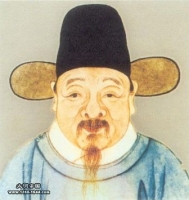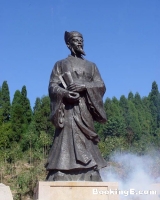| 籍貫: | 浙江青田 |
|
閱讀劉基 Liu Ji在散文天地的作品!!! 閱讀劉基 Liu Ji在百家争鸣的作品!!! 閱讀劉基 Liu Ji在诗海的作品!!! | |
劉基出身名門望族,自幼聰明好學,有神童之譽。元至順四年{1333年)23歲的劉基,一舉考中進士,開始步人仕途生涯。他立志報國,但朝廷昏庸腐敗,使他20餘年的宦海生涯屢遭磨難貶抑。元至正二十年(1360年)三月,接受朱元璋的邀請,成為參贊軍務的謀士,為明王朝的建立和發展,立下汗馬功勞。他為人剛直,膽識過人,朱元璋尊其為“吾子房(張良)也”。民間有“上有諸葛孔明,下有劉基伯溫”的稱道。
至正二十年五月,陳友諒攻下了南京外圍的重鎮太平,殺了朱元璋的養子朱文遜及守將花雲。他還在太平立國,自稱皇帝。調集舟師,從江州嚮東直指應天。聲稱此役有張士誠配合,攻陷應天,指日可待。在陳友諒的囂張氣焰面前,朱元璋的部將感到局勢緊張。有的主張出城决一死戰,有的主張棄城轉移,也有的主張獻城投降。諸說紛紜,莫衷一是。朱元璋也一時拿不定主意,便問站在一邊默不作語的劉基。劉基斬釘截鐵地回答,先斬主降者和言逃者,才能破敵獲勝。他說,陳友諒劫主稱帝,驕橫一世,其心無日不忘金陵。現在氣勢洶洶,順江東下,乃是嚮我示威,逼我退讓。我們不能讓其得逞,衹有堅决抵抗。他又說,常言道,後舉者勝,陳友諒雖兵驕將悍,但他們行軍千裏來犯我,既是疲軍,又是不義,而我們後發製人,以逸待勞,待敵深入後,我以伏兵擊之,自當必勝。這一仗對我們來說關係重大,一定要打好。劉基的一番話,堅定了朱元璋抗擊的决心,他采納了劉基的計策,巧出奇兵打敗了陳友諒的進攻。朱元璋不僅取得了保衛應天的勝利,還一鼓作氣收復了太平。鞏固了金陵這塊根據地。此役僅在劉基投奔後的兩個月,充分顯示了劉基卓越的軍事才能。
陳友諒雖退守江西、湖北一帶,但他和張士誠仍然是朱元璋的主要勁敵。為了掃平群雄,北定中原,最後推翻元朝政權,朱元璋軍中對東張西陳兩個戰略方向,持有不同的看法。多數將領主張先易後難,即先打張士誠。這一戰略思想對朱元璋也産生了影響。
劉基的主張則相反,他認為張士誠生性怯弱,胸無大志,衹求自保,這種人不足為慮。陳友諒野心勃勃,力量也強,又據長江上遊,對我威脅最大。若先打張士誠,陳友諒定會乘虛攻我;可是如果先討伐陳友諒,張士誠則不一定敢輕舉妄動。故當先除陳。陳氏一滅,張氏自孤,存亡便由我了。陳張既平,就可擁麾北上,席捲中原,大業便可告成了。劉基的分析高瞻遠矚,應該說是朱元璋掃平四海、建立大業的唯一正確戰略方案。朱元璋采納劉基之計,决定先徵陳友諒,再攻張士誠,在全面勝利的道路上邁出了舉足輕重的一步。
至正二十一年(1361年),朱元璋親率三軍溯長江西徵陳友諒。先攻安慶不剋,劉基知陳友諒重兵駐防安慶,其老巢江州(今江西九江市)必定空虛,便建言馬上轉攻江州,果然一舉而下,陳友諒棄逃武昌。不久,陳友諒部臣江西行省丞相鬍廷瑞以保留部隊為條件前來議降,朱元璋從劉基勸,接受鬍的條件。鬍降,其他守將見此紛紛前來納款,整個江西很快並入朱元璋的版圖。至正二十三年(1363年)四月,陳友諒乘朱元璋北上解小明王韓林兒安豐被圍之際,從武昌率軍傾城而出,圍攻洪都;想守回這一重鎮。守將朱文正力拒抵抗,兩軍相持多日。七月,朱元璋率大軍南下,與陳友諒决戰於鄱陽湖上。劉基日夜侍隨朱元璋左右,參與軍機。兩軍鏖戰,血染湖水,雙方死傷慘重,最後在湖面上相持不下。這時劉基嚮朱元璋獻計,建議派重兵扼守鄱陽湖四周出口之處,以睏陳友諒。不久,陳友諒率殘軍突圍。想從小港汊口處逃竄,結果被朱元璋軍扼住。陳友諒戰死,餘軍大潰。消滅陳友諒勢力以後,朱元璋馬不停蹄,立即又揮戈東進,徵伐張士誠。至正二十七年(1367年)九月,攻占平江(今江蘇蘇州市),張士誠走投無路,自縊身死。自此長江中下遊地區盡歸朱元璋所有。朱元璋對劉基說:“先生是我創立江山的第一等功臣。”
劉基還有許多出其不意的戰術,每遇戰事往往以奇計製勝。在打江州時,他見江州城墻沿江而築,又很低矮,便授意在戰艦上建造雲梯天橋。夜間駛到城墻腳下,將天橋架在城墻上,士兵緣梯而上,順利破城。至正二十三年(1363年)他奔母喪從處州返金陵,途經嚴州(今浙江建德縣),正適張士誠部來犯,嚴州守將李文忠要出兵迎擊,劉基勸阻說,不出三日,敵人會自己退走,到時出兵追擊,可獲大勝。李文忠聽從了劉基的勸說。第三天黎明,敵軍果退,李文忠出擊,大勝而歸。
劉基的運籌帷幄、神機妙算不僅使同僚下屬欽佩不已,也博得了朱元璋的信任與尊敬。朱元璋將他比作漢代謀臣張良、尊稱他“老先生”而不呼其名,經常和他一起商量軍政大事,有時遇有重大决策,僅召他一人進密室相議,一談便是半日。朱元璋有時對他幾乎到了依賴的程度。劉基母親故世,他想告假回鄉奔喪,朱元璋捨不得他離開,婉言輓留而不準假。後來勉強準了,還不時寫信到青田鄉裏請教軍政大計,劉基則詳細分析答復,總使朱元璋非常滿意。儘管這樣,最後朱元璋還是提前召他回來。見人主如此誠意待己,劉基也以朱元璋為不世之遇,悉心輔佐,知無不言,為朱氏大明王朝的建立作出了不可磨滅的貢獻。
他的著作有《鬱離子》等,《鬱離子》全書二捲,凡十八篇,一百九十五條,每條多則千言,少則百字,主要是針砭時政的語言或故事。其文構思精巧,文筆犀利,富於情趣,發人深省。作者藉假托人物鬱離子之口,發表對社會、世態人情的看法。有些見解,至今仍能給讀者以深刻的啓迪。
【劉基故居】故居為五開間。1311年6月15日,劉基生於此;1375年4月16日死於此。現存有劉基48歲棄官歸隱後修建房捨碑志,石臼等用物。《明史•劉基傳》載:“洪武四年正月賜老歸,惟飲酒,奕棋,口不言功。邑令求見不得,微服為野人謁見。基方濯足,令從子引入茅捨。”由此可見劉基當時住房的簡陋,品格的高尚。
劉基作品《百戰其略》編寫說明
白話百戰奇略》由提示、譯文、原文、註釋、附錄五部分組成,現依次逐項說明如下:
(一)、“提示”:包括兩部分內容,一是扼要概括每篇“論述”的中心內容和精神實質,指出其所論與古典兵學理論的淵源關係以及其可取性或局限性。二是着重剖析每篇“史例”在作戰指導上的得失與作戰成敗的關係,以及可供藉鑒的經驗教訓。由於該書所引史例多數比較簡略,故筆者一般都以史例原著進行分析,而分析中的引文,凡與《百戰奇略》相同的,不再註明出處,不同或為其所無者,均括註出處。
(二)、“譯文”:在忠實於原意的前提下,力求做到準確無誤、通俗暢達、生動可讀,符合軍事用語。如因原文成分殘缺或過於簡略而影響文義連貫處,所補之譯文部分,一般都加圓括號“( )”。
(三)、“原文”:以明弘治十七年(1504年)馬思進《武經總要·百戰奇法》刻本為底本(簡稱“馬本”),以明萬歷二十七年(1599年)唐富春《武經總要·百戰奇法》刻本(簡稱“唐本”)和王鳴鶴《登壇必究·百戰》刻本(簡稱“王本”,但該刻本僅存錄《百戰奇法》前集之五十戰)、崇禎九年(1636年)所刻《韜略世法》叢書收錄的《百戰奇法》之汪淇參訂本(簡稱“汪本”)為參校本,對照有關正史原著進行校勘的,凡是重要校正處,均在本書“註釋”中加以說明,不另出校記。原文校勘中需要強調說明的問題有二:
其一、該書所引古代兵法(即“法曰”內容),凡與原著不同且影響原意的,均據原著校改,並在“註釋”中說明校改理由;引文字詞雖與原著不同,但不影響原意的,一般衹註明原文,不作文字改動;凡引文脫漏成分,則補足後加方括號“〔 〕”。
其二、該書所引的史例,凡引文與史籍相悖者,均據原著予以訂正;引文字詞雖與原著不同,但並未改變原意的,一般不再更改;引文凡有重要脫漏,不補則影響文義連貫完整或者減煞該書軍事特色的,則據史書原著予以增補,所補成分加方括號“〔 〕”。
(四)、“註釋”:力求準確、簡明,一般不作字源、詞源考證。註釋的主要內容是:生僻字詞釋義,重要專用術語,兵法引文及史例出處,歷史人物及地名,重要校勘註文和足以證明其成書時代的避諱文字。這裏需要着重說明的,史例中所涉及的歷史人物,一般都加註釋,但同一人物在不同篇目中多次出現時,衹註釋首次;戰例中所涉及的歷史地名,一般都註明今地名,但同一朝代的同一地名,雖在不同篇目史例中多次出現,衹註釋首次,不同朝代的同一地名,則分別註釋。
(五)、“附錄”:為便於讀者瞭解該書的成書時代及作者等問題,本書末附錄拙文二篇:1、《百戰奇略》不是明代劉基的著作;2、《〈百戰奇略〉辨偽》質疑。
Career
Liu Ji served Zhu Yuanzhang in his rebellion against the Mongol-led Yuan Dynasty in China, which had ruled since the conquest of the Southern Song Dynasty in 1279. Liu Ji dabbled in many fields of statecraft, philosophy, scholarly works, and technology. His philosophical outlook was that of a skeptical naturalist, and he became interested in astronomy, calendrical science, magnetism, and fengshui. He was known to be a friendly associate of the mathematician and alchemist Zhao Yuqin, and collaborated with his contemporary general and scholar Jiao Yu to edit and compile the military-technology treatise of the Huolongjing, which outlined the use of various gunpowder weapons. He was very interested in the latter, and once said that "thunder is like fire shot from a cannon".
Early Service in the Yuan Dynasty
Liu Ji earned his Jinshi degree in the final years of the Mongol Yuan Dynasty, and spent much of his early career attempting to save the dynasty from collapse. Liu served the Yuan as an official for 25 years, gaining a reputation for integrity and honesty, and became known as a distinguished scholar and strategist. In 1348, Liu was appointed to a military position and assigned to put down a southern rebellion against the dynasty. The leader of the rebellion attempted to save himself by offering Liu a bribe. When Liu refused, the rebel went to Beijing and succeeded in bribing his way into favour there.
Once the secessionist had bribed his way into the regime's favour, he was given a public office and a salary. Liu Ji's relationship with the Yuan deteriorated after this event. Liu attempted to resign twice, in 1349 and 1352. He was demoted in 1358, and finally left service to retire in his ancestral homeland. In 1366, when he was fifty-five, Liu was introduced to Zhu Yuanzhang, a former leader of a radical White Lotus Buddhist rebellion who was then the leader of a broad anti-Yuan rebellion.
Service to Zhu Yuanzhang
Liu Ji served not only in the administration of Zhu Yuanzhang, but also in many battles as a commanding officer on land and water, leading the early Ming naval forces. Zhu Yuanzhang placed Liu Ji in charge of the campaign to conquer all of Zhejiang from Yuan forces. Liu was also responsible for military ventures against opposing Chinese rebel groups, as well as coastal Japanese pirates. His forces owed much of their success to the use of the medieval Chinese firearm known as the fire lance. It was during this period that he wrote the books Extraordinary Strategies of a Hundred Battles (百戰奇略) and Eighteen Strategies and Affairs (時務十八策). Later in the rebellion Zhu only rarely relied on Liu to personally command his armies in the field, as he acquired other capable generals, including Xu Da, Deng Yu and Chang Yuchun. Liu was most often consulted for his strategic advice during this period.
In 1368, after eight years of Liu Ji's service, Zhu Yuanzhang unified China. When Zhu founded the Ming Dynasty, Liu was one of his most trusted advisors, but the relatiohship between Zhu and Liu eventually deteriorated in a manner similar to the way that Liu had become estranged from the Yuan government. In 1375, Liu rejected a man, Hu Weiyong, for appointment to high office. Hu later obtained an audience with Zhu Yuanzhang and slandered Liu by telling Zhu that Liu was plotting to establish his own power. After convincing Zhu of Liu's treachery, Liu was ejected from office, and Hu Weiyong was promoted.
Death
The shock and shame of being groundlessly dismissed from office destroyed Liu's health, and he quickly died. Within five years of Liu's death the man who had slandered Liu to achieve office was himself suspected of plotting against Zhu Yuanzhang. In the subsequent orgy of Zhu's paranoid efforts to root out conspiracy, 30-40,000 people were executed.
The precise cause of Liu Ji's death is considered uncertain by modern scholars. Some scholars believe that Liu was poisoned by emperor Zhu Yuanzhang himself, not because Liu failed his duty, but because the emperor was envious and even fearful of his knowledge and influence. Other sources have pointed out that the emperor did kill many people shortly after Liu lost his official position, but they are uncertain about whether Liu was part of this group.
Prophecy
Liu Ji's most famous prophecy to Zhu Yuanzhang, written down in a lyrical style, is called the Shaobing Song (燒餅歌). The poem is written in cryptic verse and is difficult to understand. Some people believe that the Shaobing Song has predicted future events in China, including the 1449 Mongol invasion, and the 1911 founding of the Republic of China.
Biographical work
Liu Ji's official biography is found in the 128th chapter of the Ming Shi. The author Chong Tai also wrote a biography on him.
In popular culture
Shenji Miaosuan Liu Bowen (simplified Chinese: 神机妙算刘伯温; traditional Chinese: 神機妙算劉伯溫; pinyin: Shénjī Miàosuàn Líu Bówēn; literally "The Divine Witted and Marvelous Predictor Liu Bowen"), a 404 episodes long television drama about Liu Bowen, was aired on Taiwan's TTV from 23 August 2006 to 12 March 2008, starring Taiwanese actor Huang Shaoqi (黃少祺) as Liu Bowen.

